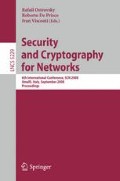Abstract
We define a general model for consecutive delegations of signing rights with the following properties: The delegatee actually signing and all intermediate delegators remain anonymous. As for group signatures, in case of misuse, a special authority can open signatures to reveal the chain of delegations and the signer’s identity. The scheme satisfies a strong notion of non-frameability generalizing the one for dynamic group signatures. We give formal definitions of security and show them to be satisfiable by constructing an instantiation proven secure under general assumptions in the standard model. Our primitive is a proper generalization of both group signatures and proxy signatures and can be regarded as non-frameable dynamic hierarchical group signatures.
Access this chapter
Tax calculation will be finalised at checkout
Purchases are for personal use only
Preview
Unable to display preview. Download preview PDF.
References
Bellare, M., Micciancio, D., Warinschi, B.: Foundations of group signatures: Formal definitions, simplified requirements, and a construction based on general assumptions. In: Biham, E. (ed.) EUROCRYPT 2003. LNCS, vol. 2656, pp. 614–629. Springer, Heidelberg (2003)
Bellare, M., Shi, H., Zhang, C.: Foundations of group signatures: The case of dynamic groups. In: Menezes, A. (ed.) CT-RSA 2005. LNCS, vol. 3376, pp. 136–153. Springer, Heidelberg (2005)
Blum, M., De Santis, A., Micali, S., Persiano, G.: Non-interactive zero-knowledge proof systems. SIAM Journal on Computing 20(6), 1084–1118 (1991)
Boldyreva, A., Palacio, A., Warinschi, B.: Secure proxy signature schemes for delegation of signing rights. IACR ePrint Archive: Report 2003/096 (2003)
Boyen, X., Waters, B.: Full-domain subgroup hiding and constant-size group signatures. In: Okamoto, T., Wang, X. (eds.) PKC 2007. LNCS, vol. 4450, pp. 1–15. Springer, Heidelberg (2007)
Chaum, D., van Heyst, E.: Group signatures. In: Davies, D.W. (ed.) EUROCRYPT 1991. LNCS, vol. 547, pp. 257–265. Springer, Heidelberg (1991)
Dolev, D., Dwork, C., Naor, M.: Nonmalleable cryptography. SIAM Journal on Computing 30(2), 391–437 (2000)
Fuchsbauer, G., Pointcheval, D.: Anonymous Proxy Signatures, http://www.di.ens.fr/homedirfuchsbau
Goldwasser, S., Micali, S., Rivest, R.: A digital signature scheme secure against adaptive chosen-message attacks. SIAM Journal on Computing 17(2), 281–308 (1988)
Groth, J., Sahai, A.: Efficient non-interactive proof systems for bilinear groups. In: Smart, N. (ed.) EUROCRYPT 2008. LNCS, vol. 4965, pp. 415–432. Springer, Heidelberg (2008)
Mambo, M., Usuda, K., Okamoto, E.: Proxy signatures for delegating signing operation. In: Proceedings of the 3rd ACM Conference on Computer and Communications Security (CCS). ACM, New York (1996)
Rackoff, C., Simon, D.: Non-interactive zero-knowledge proof of knowledge and chosen ciphertext attack. In: Feigenbaum, J. (ed.) CRYPTO 1991. LNCS, vol. 576, pp. 433–444. Springer, Heidelberg (1992)
Rivest, R., Shamir, A., Tauman, Y.: How to leak a secret. In: Boyd, C. (ed.) ASIACRYPT 2001. LNCS, vol. 2248, pp. 552–565. Springer, Heidelberg (2001)
Rompel, J.: One-way functions are necessary and sufficient for secure signatures. In: 22nd Annual Symposium on Theory of Computing, pp. 387–394. ACM, New York (1990)
Sahai, A.: Non-malleable non-interactive zero knowledge and adaptive chosen-ciphertext security. In: 40th Symposium on Foundations of Computer Science, pp. 543–553. IEEE, Los Alamitos (1999)
Shum, K., Wei, V.K.: A strong proxy signature scheme with proxy signer privacy protection. In: 11th IEEE International Workshops on Enabling Technologies: Infrastructure for Collaborative Enterprises (WETICE 2002), pp. 55–56. IEEE, Los Alamitos (2002)
Tan, Z., Liu, Z.: Provably secure delegation-by-certification proxy signature schemes. IACR ePrint Archive: Report 2004/148 (2004)
Trolin, M., Wikström, D.: Hierarchical group signatures. In: Caires, L., Italiano, G.F., Monteiro, L., Palamidessi, C., Yung, M. (eds.) ICALP 2005. LNCS, vol. 3580, pp. 446–458. Springer, Heidelberg (2005)
Author information
Authors and Affiliations
Editor information
Rights and permissions
Copyright information
© 2008 Springer-Verlag Berlin Heidelberg
About this paper
Cite this paper
Fuchsbauer, G., Pointcheval, D. (2008). Anonymous Proxy Signatures. In: Ostrovsky, R., De Prisco, R., Visconti, I. (eds) Security and Cryptography for Networks. SCN 2008. Lecture Notes in Computer Science, vol 5229. Springer, Berlin, Heidelberg. https://doi.org/10.1007/978-3-540-85855-3_14
Download citation
DOI: https://doi.org/10.1007/978-3-540-85855-3_14
Publisher Name: Springer, Berlin, Heidelberg
Print ISBN: 978-3-540-85854-6
Online ISBN: 978-3-540-85855-3
eBook Packages: Computer ScienceComputer Science (R0)

